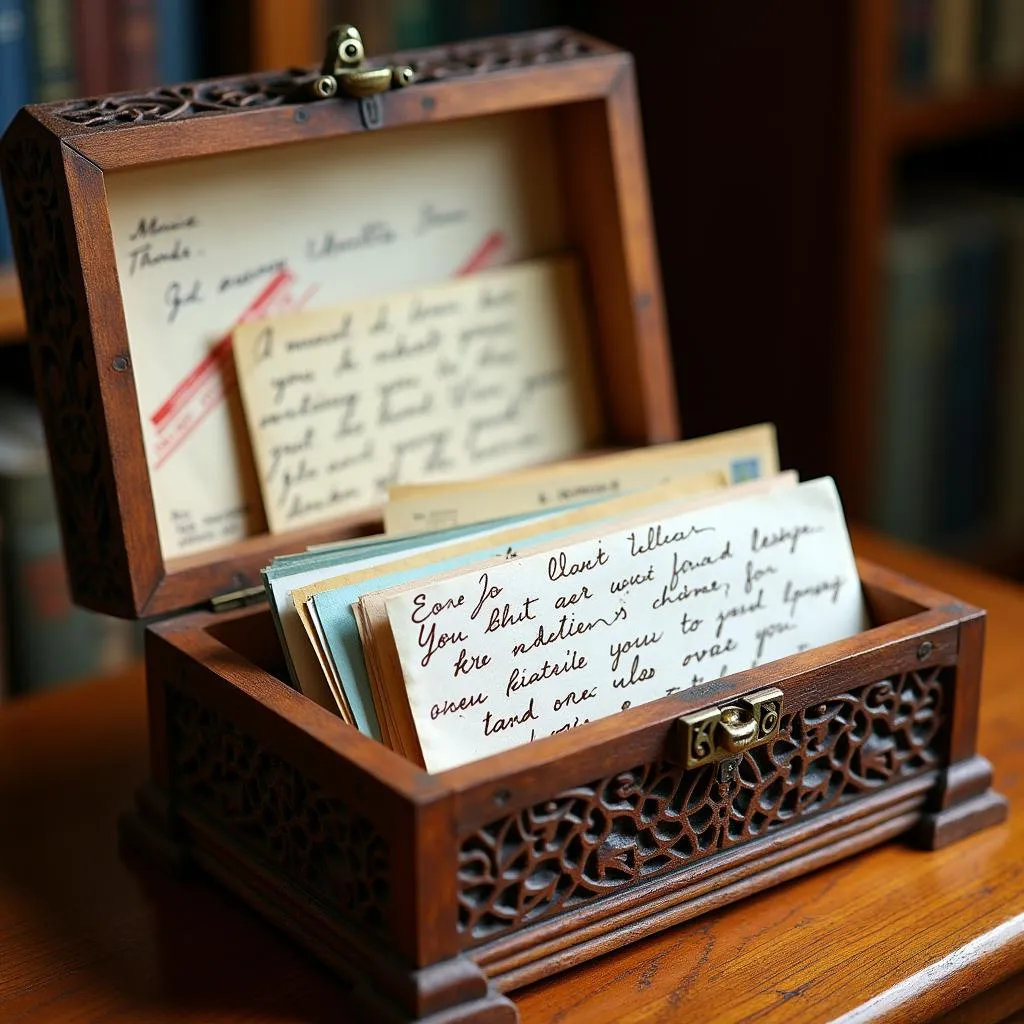The topic of describing a memorable gift is a common and important one in IELTS Speaking tests. It frequently appears in Part 2 and can lead to related questions in Part 3. This topic allows candidates to showcase their ability to narrate personal experiences, express emotions, and use descriptive language effectively. Let’s explore how to approach this topic and maximize your score.
Part 1: Introduction and Interview
In Part 1, the examiner may ask some gift-related questions to warm you up. Here are some possible questions and a sample answer:
- Do you enjoy giving gifts to others?
- What was the last gift you received?
- Do you prefer giving or receiving gifts?
Let’s look at a sample answer for question 2:
Sample Answer (Band 7-8):
“The last gift I received was a beautifully crafted leather-bound journal from my best friend for my birthday last month. It was absolutely perfect as I’m an avid writer and I’ve been wanting to start journaling regularly. The thought she put into choosing something so tailored to my interests really touched me.”
Describe a childhood memory that you cherish can be another topic that might come up in Part 1, as it often relates to memorable gifts or special occasions.
Part 2: Long Turn
Here’s a possible cue card for this topic:
Describe a memorable gift you received
You should say:
- What the gift was
- Who gave it to you
- When you received it
- Why it was memorable to youSample Answer (Band 6-7):
“I’d like to talk about a memorable gift I received a few years ago. It was a vintage record player that my grandfather gave me for my 18th birthday.
I remember the day clearly. It was a warm summer evening, and my family had organized a small party at home. After cutting the cake, my grandfather handed me a large, carefully wrapped package. When I opened it, I was surprised and delighted to see the record player.
This gift was particularly special to me for several reasons. Firstly, my grandfather and I share a love for classic rock music, and we often spend time together listening to his old vinyl records. Secondly, it was a family heirloom that had been in our family for decades, which made it even more meaningful.
The record player itself is a beautiful piece, with a wooden casing and a shiny metal arm. It still works perfectly, producing a warm, rich sound that you just can’t get from digital music.
This gift was memorable because it represented a connection between generations and our shared passion for music. Every time I use it, I’m reminded of the special bond I have with my grandfather and the importance of preserving family traditions.”
Sample Answer (Band 8-9):
“I’d like to share with you the story of an extraordinarily thoughtful gift I received, which has left an indelible mark on my life. It was a meticulously curated box of letters from various friends and family members, given to me by my sister on my 25th birthday.
The gift itself was a beautifully crafted wooden box, intricately carved with my initials. Inside were dozens of sealed envelopes, each containing a handwritten letter. My sister had spent months secretly corresponding with people who had played significant roles in my life – childhood friends, former teachers, relatives, and even a few individuals I had lost touch with over the years.
I received this remarkable gift during a small gathering at my parents’ home. As I opened the box and began reading the letters, I was overwhelmed with emotion. Each note contained memories, words of encouragement, and reflections on our shared experiences. It was as if I was reading a heartwarming chronicle of my own life, seen through the eyes of those who cared about me.
What made this gift truly memorable was its profound emotional impact. It wasn’t just an object, but a collection of sentiments and memories that spanned years and distances. The time and effort my sister had invested in coordinating this gift was astounding, and it demonstrated her deep understanding of what would be meaningful to me.
This gift serves as a poignant reminder of the connections I’ve made throughout my life and the impact I’ve had on others, sometimes without even realizing it. Whenever I’m feeling low or need inspiration, I return to this box of letters. It never fails to uplift my spirits and remind me of the rich tapestry of relationships that have shaped who I am today.”
 A wooden box filled with handwritten letters as a memorable gift
A wooden box filled with handwritten letters as a memorable gift
Follow-up Questions:
- How did this gift change your relationship with the giver?
- Do you think the monetary value of a gift is important?
Sample Answer for Question 1 (Band 8-9):
“This extraordinary gift undeniably deepened my relationship with my sister. It revealed the depth of her understanding of me and the lengths she was willing to go to create something meaningful. Her thoughtfulness and the sheer effort she put into this gift demonstrated her love in a way that words alone never could. Since then, we’ve developed an even stronger bond, characterized by a deeper appreciation for each other’s thoughtfulness and a shared understanding of what truly matters in life.”
Sample Answer for Question 2 (Band 8-9):
“In my opinion, the monetary value of a gift is far less significant than its emotional or practical value. A gift that shows the giver has paid attention to your interests, needs, or dreams is infinitely more valuable than an expensive item chosen without much thought. That said, the context of gift-giving can influence expectations around monetary value, such as in certain cultural settings or for milestone events. However, I firmly believe that the most treasured gifts are those that resonate on a personal level, regardless of their price tag.”
Part 3: Two-way Discussion
In this section, the examiner will ask more abstract questions related to the topic of gifts. Here are some possible questions and sample answers:
- How has gift-giving changed in your country over the years?
- Do you think there’s too much emphasis on material gifts in modern society?
- How might gift-giving practices differ across cultures?
Sample Answer for Question 2 (Band 7-8):
“I do believe that in many societies, there’s an excessive focus on material gifts. This trend seems to be driven by consumerism and the pressure to demonstrate affection or success through expensive presents. However, this emphasis on material gifts can sometimes overshadow the true meaning of gift-giving, which is to show care and appreciation for others.
That being said, I think there’s a growing awareness of this issue, and many people are now shifting towards more meaningful gift-giving practices. For instance, there’s an increasing trend of giving experiences rather than objects, or making charitable donations in someone’s name. These alternatives often carry more emotional value and can be more fulfilling for both the giver and the recipient.
Ultimately, while material gifts still play a significant role in our society, I believe we’re gradually moving towards a more balanced approach that values thoughtfulness and personal connection over monetary worth.”
Sample Answer for Question 2 (Band 8-9):
“The emphasis on material gifts in modern society is indeed a complex and nuanced issue. On one hand, the commercialization of holidays and special occasions has undoubtedly led to an increased focus on tangible, often expensive gifts. This trend can create undue financial pressure and sometimes detracts from the genuine sentiment behind gift-giving.
However, it’s crucial to recognize that material gifts can also be vehicles for expressing deep emotions and strengthening relationships when chosen thoughtfully. The key lies in the intention and consideration behind the gift, rather than its monetary value.
Moreover, we’re witnessing a gradual shift in societal attitudes towards gift-giving. Many people are now prioritizing experiences, handmade items, or gifts that align with the recipient’s values, such as eco-friendly products or charitable donations. This evolution suggests a growing awareness of the potential downsides of materialism and a desire to infuse gift-giving with more meaning.
In essence, while the emphasis on material gifts remains prevalent, there’s an encouraging trend towards more mindful and personalized gift-giving practices. This balance allows us to preserve the joy of giving while mitigating the negative aspects of excessive materialism.”
Describe an occasion when you gave a gift to someone is a related topic that could provide additional context for discussing gift-giving practices and their cultural significance.
Key Vocabulary and Phrases
To enhance your speaking performance, incorporate these sophisticated vocabulary items and phrases:
-
Indelible mark (adj + n) /ɪnˈdelɪbl mɑːrk/ – A lasting impression or effect
Example: “The experience left an indelible mark on my memory.” -
Meticulously curated (adv + adj) /məˈtɪkjələsli ˈkjʊəreɪtɪd/ – Carefully and precisely selected
Example: “The exhibition featured a meticulously curated collection of artworks.” -
Poignant reminder (adj + n) /ˈpɔɪnjənt rɪˈmaɪndər/ – A touching or emotionally moving memento
Example: “The old photograph served as a poignant reminder of our childhood together.” -
Profound emotional impact (adj + adj + n) /prəˈfaʊnd ɪˈməʊʃənl ˈɪmpækt/ – A deep and significant effect on one’s feelings
Example: “The film had a profound emotional impact on the audience.” -
Rich tapestry (adj + n) /rɪtʃ ˈtæpɪstri/ – A complex and diverse collection or mixture
Example: “His life experiences formed a rich tapestry of adventures and lessons.”
 A visual representation of a rich tapestry of life experiences
A visual representation of a rich tapestry of life experiences
Examiner’s Advice
To achieve a high score in the IELTS Speaking test, particularly when describing a memorable gift:
-
Use a range of descriptive language: Incorporate adjectives and adverbs to make your description vivid and engaging.
-
Structure your answer logically: Follow the cue card prompts and organize your thoughts coherently.
-
Demonstrate a wide vocabulary: Use sophisticated and less common words appropriately to showcase your language proficiency.
-
Express emotions and personal reflections: Don’t just state facts; share how the gift made you feel and why it was significant to you.
-
Practice fluency: Aim for smooth delivery without long pauses. Regular practice with various topics can help improve your overall fluency.
-
Engage with abstract ideas: In Part 3, try to discuss broader concepts related to gift-giving, showing your ability to think critically and express complex ideas.
-
Use idiomatic expressions naturally: Incorporate idiomatic language where appropriate, but ensure it fits the context naturally.
Remember, the key to success in the IELTS Speaking test is to communicate effectively and demonstrate your English language skills across all assessment criteria: Fluency and Coherence, Lexical Resource, Grammatical Range and Accuracy, and Pronunciation.
Describe a childhood toy you remember fondly is another topic that can help you practice describing personal memories and emotions, which is crucial for discussing memorable gifts effectively.
By following these guidelines and practicing regularly, you can significantly improve your performance in the IELTS Speaking test, particularly when describing a memorable gift or any personal experience.


